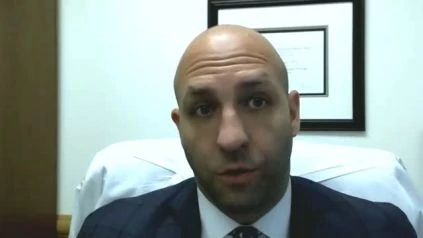Russell Langan, M.D., Chief of Surgical Oncology and Hepatopancreatobiliary Surgery at Saint Barnabas Medical Center, an RWJBarnabas Health facility, and Surgical Oncologist at Rutgers Cancer Institute of New Jersey speaks about RWJBarnabas Health Pioneers Innovative Pancreatic Cyst Surveillance Program.
Link to Article:
https://www.prnewswire.com/news-releases/rwjbarnabas-health-pioneers-innovative-pancreatic-cyst-surveillance-program-301245061.html
In order to classify, track, follow, and monitor patients with pancreatic cysts, Saint Barnabas Medical Center (SBMC), an RWJBarnabas Health facility, developed one of the first cloud-based data management systems in the world. SBMC’s Pancreatic Cyst Surveillance Program, which has a specific collaboration with Eon, a healthcare technology company, detects patients when incidental scans, such as an MRI, CT scan, or ultrasound, identify pancreatic cysts, and at-risk individuals are then notified via a nurse navigator for possible follow-up. The software has reported 136 patients so far.
Traditional surveillance systems rely on an antiquated system of manual data entry and monitoring that isn’t designed to respond to patient needs in a timely and consistent manner. This new cloud-based software alerts high-risk individuals instantly, ensuring timely and informed treatment. Furthermore, the platform feeds a cyst’s unique characteristics, such as its size, pancreatic duct dilation, and nodularity, into an algorithm that tells doctors objectively whether the cyst is at risk of malignancy over time. When a patient chooses to participate in the program, a nurse navigator may help them schedule the appropriate screenings, treatments, or surgery.
“I believe this technology-based approach will forever change the way we monitor and treat patients with pancreatic cysts and tumors, and SBMC is excited to be at the forefront of the next breakthrough in the management of pancreatic care,” said Russell Langan, M.D., Chief of Surgical Oncology and Hepatopancreatobiliary Surgery at SBMC and Surgical Oncologist at Rutgers Cancer Institute of New Jersey, the state’s only National Cancer Institute-designated Comprehensive Cancer Center. “Because pancreatic surgery carries morbidity and a potential mortality rate, we want to ensure patients aren’t undergoing unnecessary surgery, however, when a pancreatic cyst does require surgery, we want to operate at the most opportune time.”
Following the discovery of a pancreatic cyst, a multidisciplinary team of physicians, medical oncologists, radiation oncologists, gastroenterologists, radiologists, pathologists, and geneticists reviews each patient’s case on a weekly basis to assess the best course of care. Since the majority of pancreatic cysts are precancerous, it’s important that the whole team considers the risks of surgical intervention versus ongoing surveillance or another course of action. Approximately 90% of cysts may not need surgery, with certain patients needing only extra screening and/or endoscopy with a fluid biopsy. However, about 10% of pancreatic cysts necessitate more drastic treatment.
“This is preventative medicine at its best for pancreatic care in general. By capturing patients who have a risk of developing pancreatic cancer in their lifetime, we can monitor these patients and determine whether medical intervention is necessary,” said Dr. Langan. “Through our unique multidisciplinary approach and partnership with Rutgers Cancer Institute of New Jersey, we are able to assess patients on a case-by-case basis to ensure we’re delivering the highest quality of care.”

